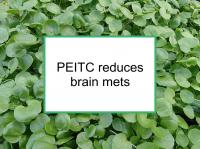Isothiocyanates, compounds found primarily in cruciferous vegetables, have been found to have chemopreventive activities against breast cancer. Among the most studied isothiocyanates are sulforaphane, benzyl isothiocyanate (BITC), allyl isothiocyanate (AITC), and phenethyl isothiocyanate (PEITC).
PEITC has been found to reduce the growth of various types of human breast cancer cells, decrease angiogenesis (the process by which tumors send out signals to induce surrounding normal tissues to grow new blood vessels into the tumor), and inhibit the growth of HER2-positive (HER2+) mammary tumors in mice. Now a new study has reported that PEITC can inhibit metastasis to the brain in a mouse model of breast cancer.
Sources of phenethyl isothiocyanate (PEITC)
Watercress is the best source of PEITC, but it is also present in horseradish, turnips, mustard, garden cress, cabbage, cauliflower, brussels sprouts, rutabagas, and radishes. It is inadvisable to take PEITC supplements. First, it has been demonstrated that chemopreventive levels of PEITC can be obtained by including watercress and other cruciferous vegetables in the diet. Second, isothiocyanates may damage the DNA of normal cells at doses obtainable through use of supplements (see Natural isothiocyanates: Genotoxic potential versus chemoprevention below).
Latest research finds PEITC inhibits metastasis to brain
The study referenced at the beginning of this news story was designed to investigate the anti-metastatic effects of PEITC in a new mouse model of breast cancer metastasis. To conduct the study, mice were divided into groups and injected (into the left ventricles of the hearts) with MDA-MB-231-BR (BR-brain seeking ER-/PR-) breast cancer cells. The migration of the cells to the brain was monitored using a non-invasive technique. The authors performed experiments with different groups of mice in order to study the influence of PEITC on tumor growth and metastasis.
First, mice were given 10 μmol PEITC orally for 10 days before to the injection of tumor cells. It was found that PEITC was effective in preventing the migration of tumor cells to the brain. Second, mice were given 10 μmol PEITC every day starting with the 14th day after the tumor cell injection. It was found that the rate of growth of metastatic brain tumors was approximately half in PEITC-treated mice compared to that of untreated controls. The median survival of tumor-bearing mice treated with PEITC was longer by 20.5%. In addition, compared to the controls, the brains of PEITC-treated mice had reduced expression of HER2, EGFR and VEGF. The authors comment that this is the first study to demonstrate anti-metastatic effects of PEITC in this new breast cancer metastasis model, providing the rationale for further clinical investigation.
Please see our articles on what HER2+ or triple negative breast cancer patients should eat for more information.
